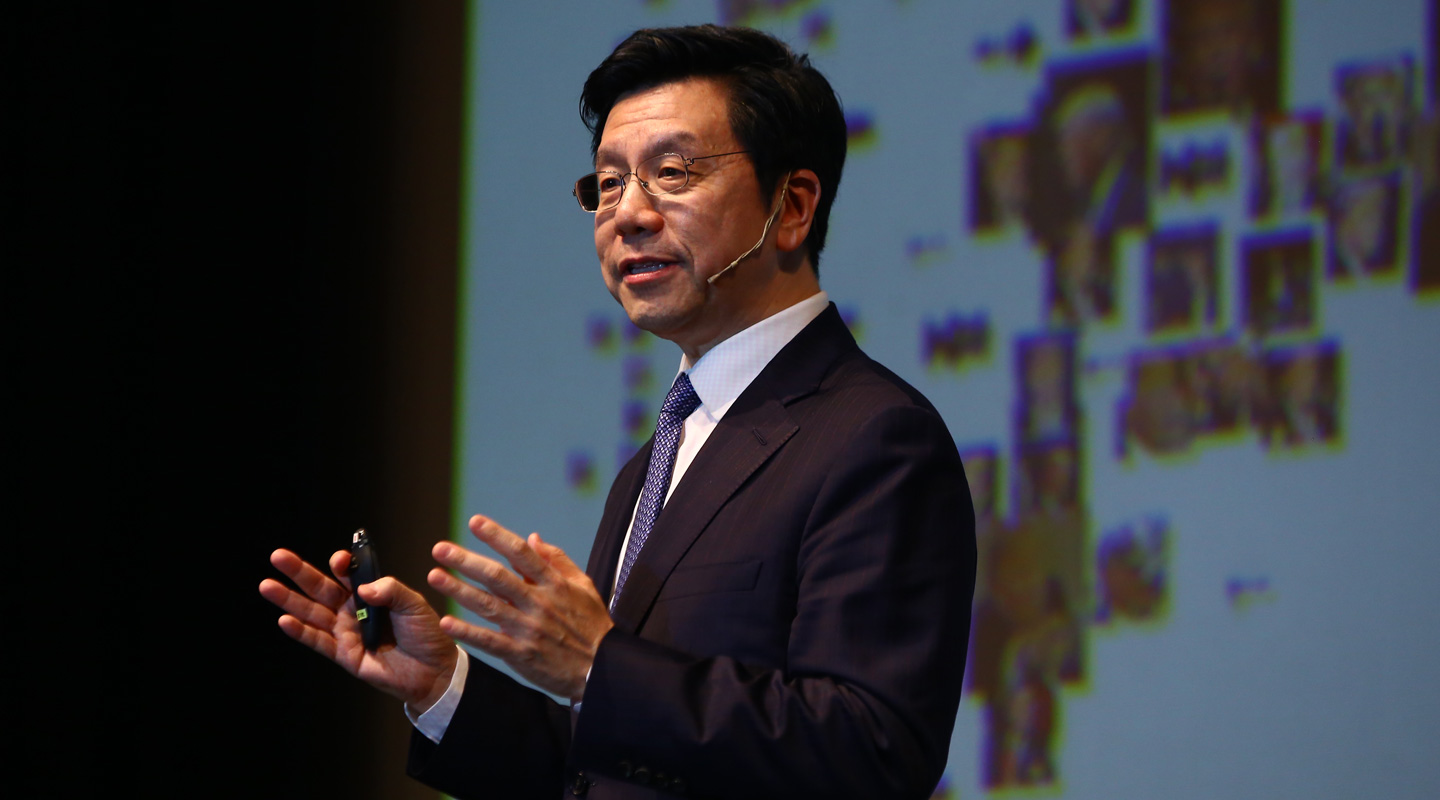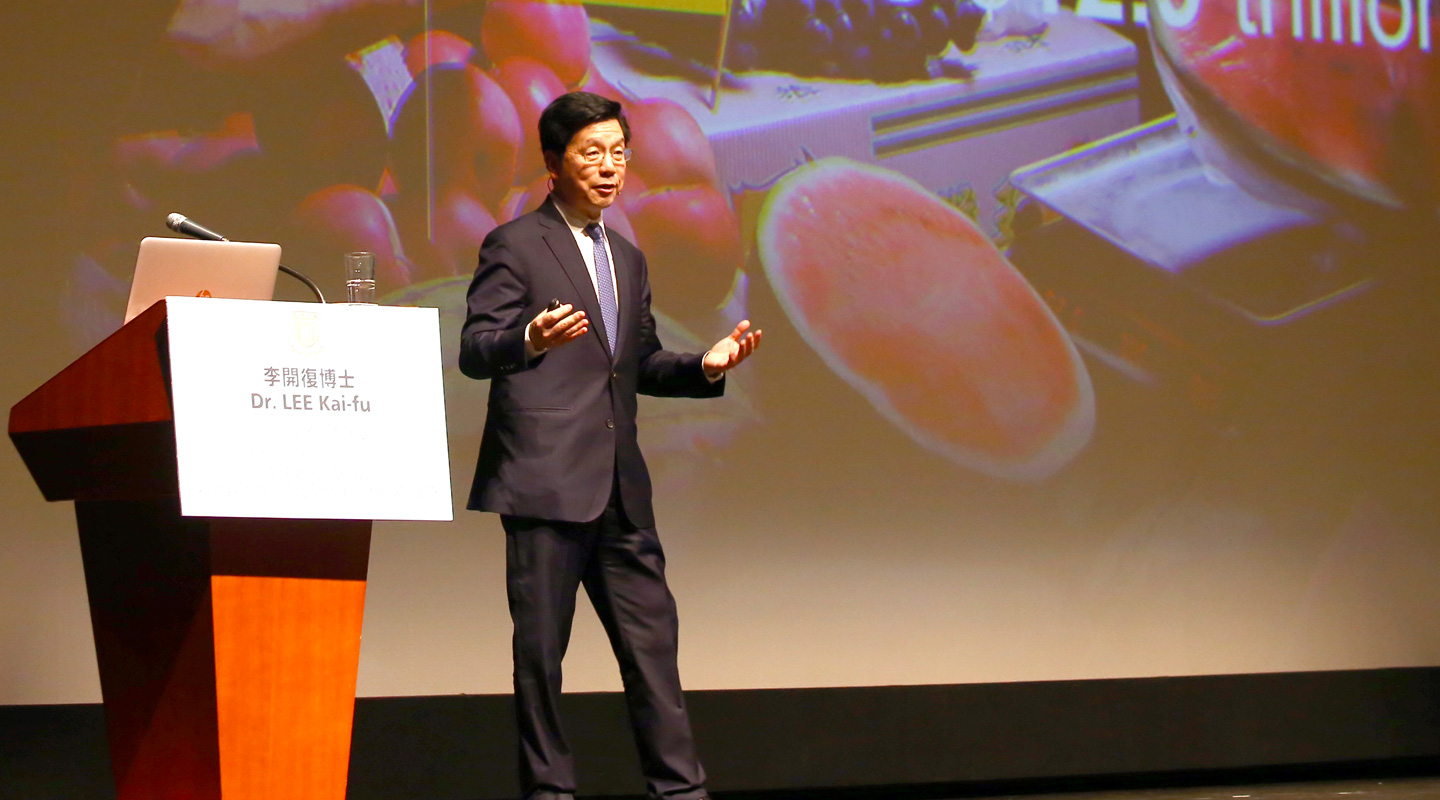Dear readers, With the launch of e-newsletter CUHK in Focus, CUHKUPDates has retired and this site will no longer be updated. To stay abreast of the University’s latest news, please go to https://focus.cuhk.edu.hk. Thank you.
Hear the Oracle Speak
Lee Kai-fu forecasts the future of AI

Just two days after the conclusion of the ‘Book Crossing Pavilion’ held by the I·CARE Book Festival in which tens of thousands of used books were snatched up by throngs of CUHK members, the foyer of the Sir Run Run Shaw Hall was once again swarming with people who came to hear Dr. Lee Kai-fu, hailed as ‘the Oracle of AI’ and followed by over 50 million fans on social media, deliver the Sir Run Run Shaw Distinguished Visiting Scholar Lecture on 20 March.
Addressing a packed house of over one thousand students, faculty and tech enthusiasts, Dr. Lee, a former Apple, Microsoft and Google executive who now chairs Sinovation Ventures, offered a visionary and compelling presentation on the rapid rise of AI, the Sino-American battle for AI supremacy, the inevitable automation of routine jobs, and a blueprint for coexistence between humans and robots.
At the beginning of the lecture, Dr. Lee pointed out that throughout artificial intelligence’s 60-year history, the biggest breakthrough that happened in the field is deep learning. It is a technology that can take a huge amount of data and learn to recognize, predict and synthesize at superhuman accuracy. If we show the deep learning network a massive number of food photos, for example, it can learn to recognize food and tell ‘hot dog’ from ‘no hot dog’. Or if we show the network many pictures, videos and sensory data from driving on the highway, it can learn to drive a car as well as a human being does.
Such technological leap is leading to what Dr. Lee called ‘the four waves of artificial intelligence’. Internet AI, which started in 1998, enables Amazon to predict what its users might want to buy and powers Facebook to suggest what its users might want to follow. In Business AI starting in 2004, data have become a goldmine for banks, insurance companies and hospitals to improve decision-making and maximize productivity. Perception AI started in 2011 when we gave AI the ability to see, hear and speak. In the fourth wave of Autonomous AI starting in 2015, AI is given the ability to respond to the world around it, to move intuitively, and to manipulate objects as easily as a human can.
The era of AI discovery has been led by the US and its visionary researchers, but now we have entered the era of AI implementation where, as Dr. Lee put it, ‘what really matters is not who can write a better scientific paper, but who can quickly build applications on a large amount of data.’ That is where China’s strengths come into play.

China has a number of distinct advantages over the US in the AI race. A massive number of young Chinese engineers are marching into the AI industry. They are relentlessly driving Chinese product innovation which has been catching up with that of the US. Over the past 10 years, Chinese companies have leapfrogged from copying from the US (e.g., Baidu copied from Google) into leading brand-new innovations (e.g., the Alibaba-owned fintech company Ant Financial).
China is a large market, which gives entrepreneurs more users, more revenue, more investment and, most importantly, more data which are the rocket fuel for the AI engine. ‘If data were the new oil, then China was the new OPEC,’ Dr. Lee quipped.
AI is creating immense value, but it doesn’t come without challenges to humanity. ‘AI will increasingly replace repetitive jobs. Not just blue-collar work but a lot of white-collar work,’ Dr. Lee explained, predicting that 40% of jobs in the world, including truck drivers’, telesales people’s, security guards’ and even radiologists’, will become displaceable by technology over the next 15 years.
The creative and the complex, such as those done by scientists and artists, economists and CEOs, will be protected, because ‘AI can optimize but not create.’ Another thing that AI cannot do is love. ‘It’s OK to build robots to remind older people to take their medicine and prevent them from falling, but robots don’t show love.’ Therefore, jobs that may not be particularly creative but require compassion, empathy and trust, such as tutors and elderly caregivers, will also be safe.
At the end, Dr. Lee shared his vision of how humans should embrace the positive changes brought about by AI. ‘In the future, we will thank AI as something that comes to liberate us from having to do the routine jobs, to push us into doing things we love and are good at, and to remind us what it is that makes us human.’ After all, AI is merely a tool that we, as humans, control and run. We are the ones who have free will and it is up to us to direct the plots of the AI story.
Christine N.
This article was originally published in No. 536, Newsletter in Apr 2019.